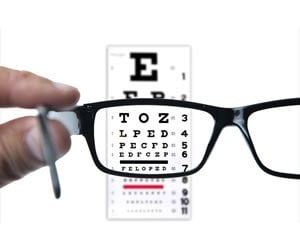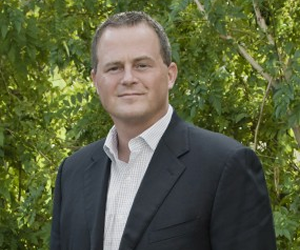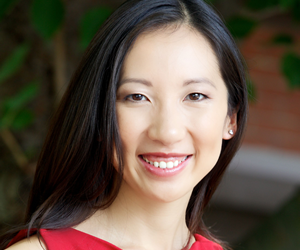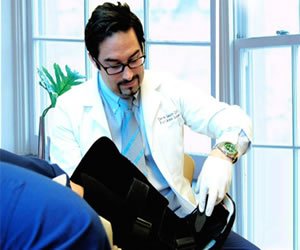
Optometry
When John Flanagan was 5 years old, he began suffering from migraines. “One of the things my doctor asked me to do was go and get my eyes checked,” says the British-born Dean of the ... Read more
Suzanne Barston
Updated August 25, 2022 by Suzanne Barston

Medical
Well Baby visits can be stressful for both physicians and the new parents – not to mention the baby! Discussions of neonatal care, height and weight development, and the achievement of milestones can take up ... Read more
Brian Wu
Updated March 19, 2019 by Brian Wu

Pre-Medical
When did you know you wanted to be a doctor? the pre-med asked. Maybe it should have been an easy question to answer, but it wasn’t. I have friends who have known as long as they ... Read more
Megan Riddle
Updated June 27, 2022 by Megan Riddle

Pre-Medical
Unfortunately, roughly half of all applicants to American allopathic medical schools will not receive an acceptance letter this spring. If your application process has concluded in this disappointing manner, ask yourself these questions before you ... Read more
Anubodh “Sunny” Varshney
Updated June 27, 2022 by Anubodh “Sunny” Varshney

Physician Q&A
Dr. Barbara Pro, a medical oncologist in Philadelphia, is a Thomas Jefferson University-Kimmel Cancer Center physician, as well as a professor and director of the Cutaneous Lymphoma Center. Dr. Pro received her MD from University ... Read more
Juliet Farmer
Updated June 27, 2022 by Juliet Farmer

Pre-Health
Life as a med student is a blur of tests and clinicals with many nights of bleary-eyed studying in less-than-ideal spaces. The whole combination of classes and clinical shifts has its toll on the body.Having ... Read more
Shire Lyon
Updated June 27, 2022 by Shire Lyon

Healthcare News and Policy
Republished with permission from here. “What can you do here that we can’t do at home?” This question angered my resident. How dare a patient admitted to the hospital ask for justification of their plan? The ... Read more
Kevin Dueck
Updated June 27, 2022 by Kevin Dueck

Psychologist and MSW Q&A
Dr. Kent Kiehl is an associate professor in the department of psychology at the University of New Mexico. He received a bachelor’s degree in psychology with an emphasis in biology from the University of California ... Read more
Juliet Farmer
Updated June 27, 2022 by Juliet Farmer

Budgeting
Medical students deal with a lot of scary things: frequent do-or-die exams, looming USMLE or COMLEX tests, and being responsible for a patient’s care for the first time are a few examples. Sadly, however, one ... Read more
Brent Schnipke
Updated July 22, 2022 by Brent Schnipke

Physician Q&A
Dr. Leana Wen was on a roll. The Washington University medical student was president of the American Medical Student Association, and was thoroughly enjoying her training. Then, her mother fell ill, and she found herself ... Read more
Suzanne Barston
Updated June 27, 2022 by Suzanne Barston

Pre-Medical
In 2013, roughly half of all medical school applicants did not receive an acceptance letter. Though many applicants possess a genuine passion for helping others through medicine, the medical school application process grows more competitive ... Read more
Anubodh “Sunny” Varshney
Updated June 27, 2022 by Anubodh “Sunny” Varshney

Pre-Medical
The premed journey is different for everyone. For some, it’s really not that much of a struggle to get accepted into medical school. For others, it’s a significant battle every step of the way. However, ... Read more
PreMedLife
Updated June 27, 2022 by PreMedLife

Podiatrist Q&A
Devon Glazer, DPM, Fellow of the American College of Foot and Ankle Surgeons (FACFAS) and Fellow of the Academy of Ambulatory Foot and Ankle Surgery (FAAFAS), is a partner at Artisan Foot and Ankle with ... Read more
Juliet Farmer
Updated June 27, 2022 by Juliet Farmer

Physician Q&A
Despite being the current President of the American College of Physicians (ACP), David A. Fleming, MD, MA, FACP thinks of himself as a “simple country doc”. The native Missourian’s roots were indeed in rural, community-based ... Read more
Suzanne Barston
Updated June 27, 2022 by Suzanne Barston

Medical School
Republished with permission from here. Congratulations! You’ve made it to the clinical portion of medical school. Now you’ll work alongside interns, residents, attendings, pharmacists, social workers, and a myriad of other health care workers to ... Read more
Rishi Kumar
Updated June 27, 2022 by Rishi Kumar

Medical
Neuromodulation is an exciting therapy for improving neurological ailments. When I graduated medical school in 2009, I had no idea what “neuromodulation” meant or the surgeries it encompasses despite my interest in neurosurgery. Even today, ... Read more
Shannon Hann
Updated March 19, 2019 by Shannon Hann

Pre-Medical
Pre-medical students can – and should – take advantage of the many opportunities available to them to gain valuable insight into what it is like to be a physician. Some of these experiences involve clinical ... Read more
Anubodh “Sunny” Varshney
Updated June 27, 2022 by Anubodh “Sunny” Varshney

Medical
I am a young hospitalist who is 16 months into my role at an urban academic medical center. Unlike many of my more-senior colleagues who found their way to hospital medicine by circumstance, luck, or ... Read more
Joshua Allen-Dicker
Updated August 25, 2022 by Joshua Allen-Dicker

Medical School
“To sleep, perchance to dream – ay, there’s the rub” ~ Hamlet The irony of being on night float in psychiatry is that I would write orders for a lot of sleep medications while struggling ... Read more
Megan Riddle
Updated June 27, 2022 by Megan Riddle


















